Cost of living: Shoppers urged to consider the planet
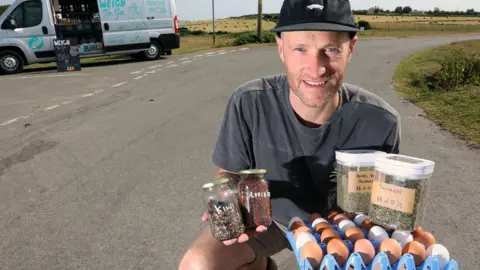 British Business Bank
British Business Bank Time-short customers are turning their backs on greener ways of shopping as life returns to normal after the Covid pandemic, a business owner has said.
Owain George said his refill business thrived in lockdown but people had returned to prioritising convenience.
He said a misconception refill is more expensive than supermarkets made it hard during the cost of living crisis.
He has paused his mobile refill service in Vale of Glamorgan and reduced his Ogmore-by-Sea shop's opening hours.
Another refill business in the county, Awesome Wales, is closing one of its three shops.
Back in 2018, TV series Blue Planet II highlighted the scale of sea pollution, prompting many to cut back on single-use plastic.
But have shoppers had their fill of refill? Could shopping in zero-waste stores actually save them money?
Owain set up Weigh To Go Refill during the Covid pandemic two years ago.
He has a mobile refill van that visits rural areas so customers can fill their own jars and bottles with everything from dried pasta to hand wash, avoiding packaging.
This year he opened a shop in his home village.
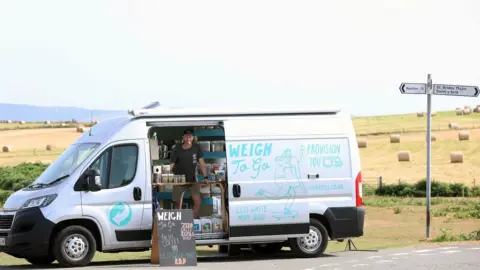 British Business Bank
British Business Bank What began as a buoyant lockdown business has become harder to sustain as life returns to normal after the pandemic, he said.
"It doesn't sustain a wage for me. It doesn't pull enough money for me to pay my bills at home," he said.
"I've taken the van off the road at the moment, the shop is open two days a week and I've taken work elsewhere."
Owain was inspired to set up his business after working as a snowboard instructor in the French Alps for 12 years where he witnessed increasingly warmer winters as a result of climate change.
He began selling goods out of his van at markets, which was an instant hit with customers who were more comfortable with shopping outdoors, before taking it to various rural locations in Vale of Glamorgan.
"People were working from home, people had time on their hands and maybe had time for those little habit changes that they'd been thinking about doing," he said.
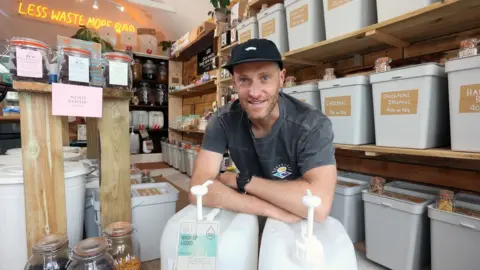 British Business Bank
British Business Bank But things began to change as Wales came out of lockdown.
"People went back to offices, schedules became busier again, new habits that weren't quite ingrained fell off the wagon a little bit," he said.
He opened his shop in his home village in spring and was sure it would be a success because the only other place selling groceries in the village is the Post Office and it is a 20-minute drive away from another refill shop.
"It's been a struggle if I'm honest," he said.
"It's a struggle to get people there."
So what is stopping people from doing their shop in a zero waste store like Owain's?
"There's a common misconception that it's more expensive to shop in a refill shop and I don't know where that's come from," he said.
He said weight-for-weight many items, such as herbs and spices, were considerably cheaper in zero-waste stores than in the supermarkets.
"The main thing about shopping zero-waste is that you're only paying for what you need… you can just come in and get 450g of pasta or 10g of fennel seeds if that's what you need for your meals," he said.
"But it takes a bit more thought about how you're shopping and it's asking most people to change their habits."
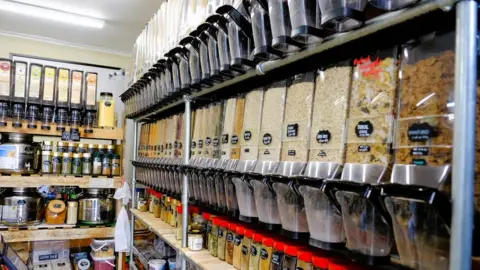 Marguerite Pearce
Marguerite PearceHe said it was hard to compete with the convenience of a big supermarket. "If you can sit on the sofa with a glass of wine and an app on your phone and get your delivery for the next day then that's going to be an easier option a lot of the time," he said.
Dr Nicole Koenig-Lewis, a reader in marketing at Cardiff Business School, agreed, saying getting consumers to change their habits was fraught with difficulty.
"There is a disjuncture between attitudes and behaviours - so whilst consumers might explicitly state positive attitudes towards sustainable packaging solutions, this might not reflect their underlying attitudes and subsequent behaviour which might be guided by habit, emotions and impulse at the point of purchase," she said.
She said the cost-of-living crisis was also having an impact, making consumers more careful in their spending habits.
"This includes preference for online shopping but also convenience, which includes saving on fuel by avoiding multiple shopping trips," she said.
She said currently many types of local, independent, community-based and smaller shops were having a difficult time due to increased energy costs, increased rents and low footfall.
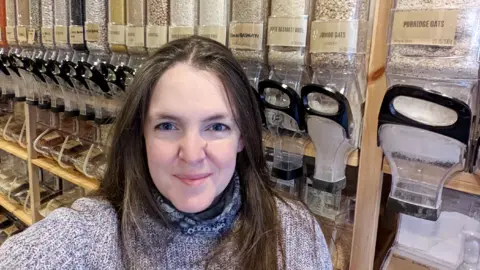 Amy Greenfield
Amy GreenfieldAmy Greenfield and her partner opened their first Awesome Wales zero-waste shop in Barry in July 2019.
Their Cowbridge shop followed in 2020 and they opened a fruit and veg stall at Cardiff's University Hospital Of Wales a few months ago.
But the shop in Cowbridge is closing.
Amy said the Cowbridge store was "never really given a chance to thrive" as Wales went into a firebreak lockdown the week after it opened.
She also said shopping habits in Barry and Cowbridge were very different, with customers in Barry shopping little and often.
"That's just not the shopping behaviour in a more affluent area," she said.
"It seems to us that people who have the luxury of more choice and more money to spend might choose the convenient option over the zero-waste option - that's our experience anyway."
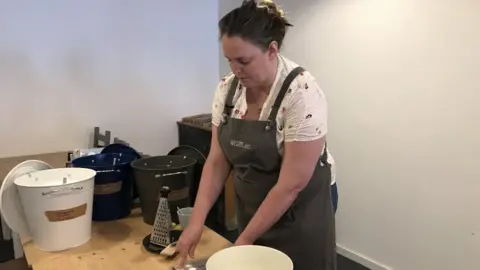
Amy also believes zero-waste businesses could help cash-strapped customers rein in their spending.
Since the crisis took hold she has experienced higher customer numbers but said the average basket spend was lower.
She said their loose fruit and veg were popular as it allowed customers "a little bit of variety in their fruit bowl without having to buy multiple pre-packed options".
"You can buy exactly what you need, you don't need to be forced to buy a bag of six apples, you can buy one or two," she said.
Amy said overall Awesome Wales, which is run as a social enterprise, had gone from strength to strength: in lockdown they once sold eight tonnes of bread flour in a week.
She said the Barry store sustained other green projects such as a nappy library and a "library of things" where you can borrow things you need but do not own.
She said the pandemic had led to more people working flexibly from home, allowing more of their customers to visit during the week - but they had not retained all the customers they gained in the pandemic.
"Some people were desperate for our services during the beginning of lockdown when they couldn't access stuff elsewhere but we haven't seen them stay, their loyalty hasn't stayed really," she said
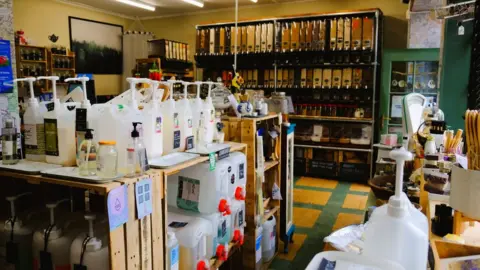 Marguerite Pearce
Marguerite PearceZero-waste shop and cafe Y Ty Gwyrdd opened in Denbigh in June 2021.
Its operations manager, Marguerite Pearce, said it was going well.
"Not wanting to tempt fate but overall I would say footfall has gradually been increasing as we've developed a regular customer base over this time," she said.
"We do see the usual retail lows after Christmas and in September when schools go back… but it's nice to have some quieter periods to catch up on jobs," she said.
So what is the future for zero-waste shopping?
Amy would like to see more shops like hers thriving but would also like Wales to follow France's lead and bring in green legislation that would mean supermarkets have to replace plastic packaging with refill stations.
"I think without that it's very unlikely that larger retail is going to change and offer more options that people really want," she said.
But Dr Koenig-Lewis is not convinced refill options in supermarkets are the way forward and said while it would make refill more mainstream, consumers value convenience and might lose interest once the novelty has worn off.
She does not predict a growth in independent zero-waste shops in the current economic climate.
"They have a rather niche target market and often a limited product range," she said.
"The general public might not be very familiar with these shops and know much about how they work... there is still a need in raising awareness about zero-waste shops and how they support the environment and the local community."
Owain is staying positive and hopes to get his van back on the road in the new year.
"I'm hoping now to rebuild," he said.
For him it is more than a business - living by the sea he sees the environmental impact of single-use plastic packaging daily.
"It is being washed up on the shores every single day."

- WHO DO WE THINK WE ARE?: Huw Edwards explores the source of Wales' identity
- WALES ON AIR: A unique concert reflecting life in Wales

